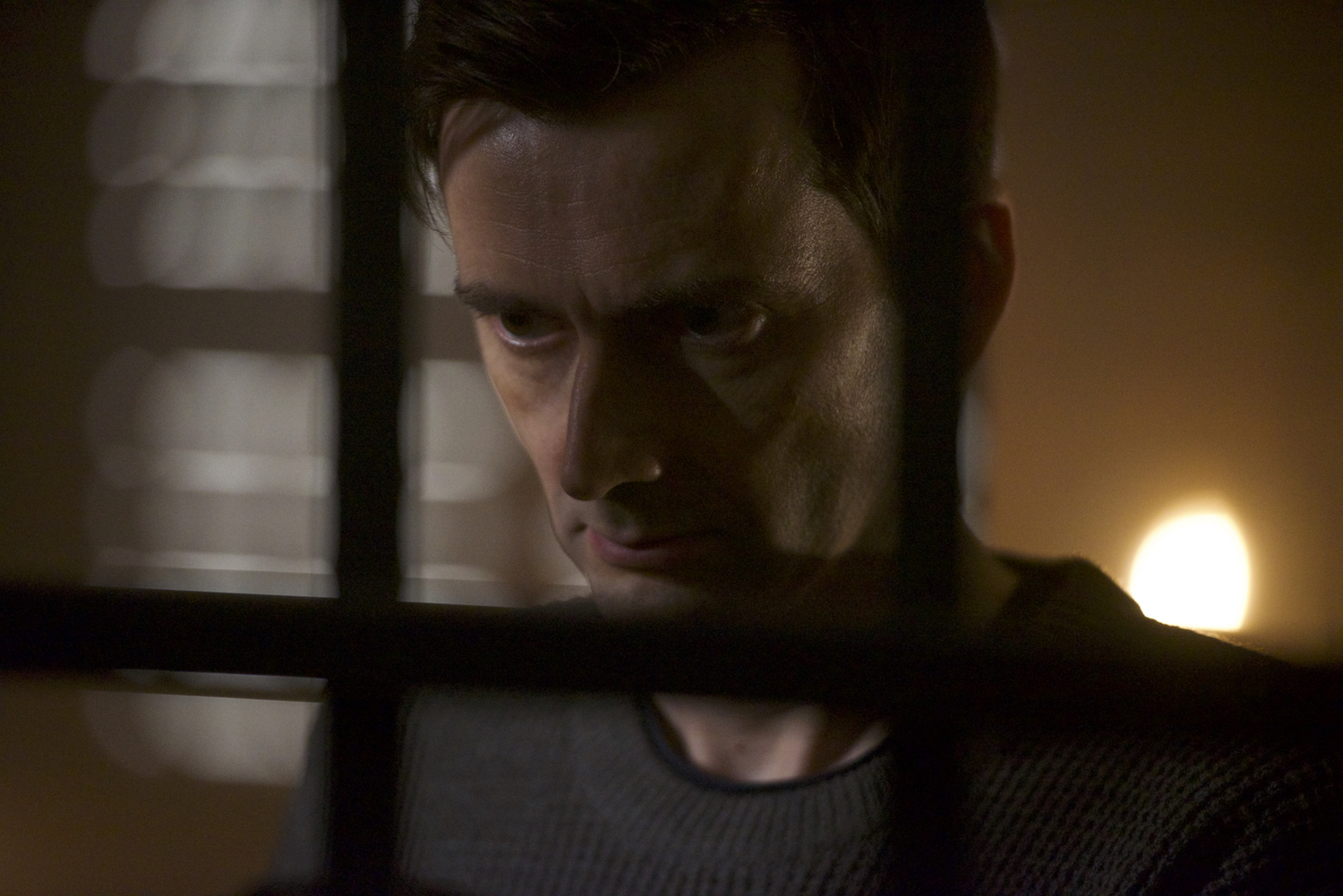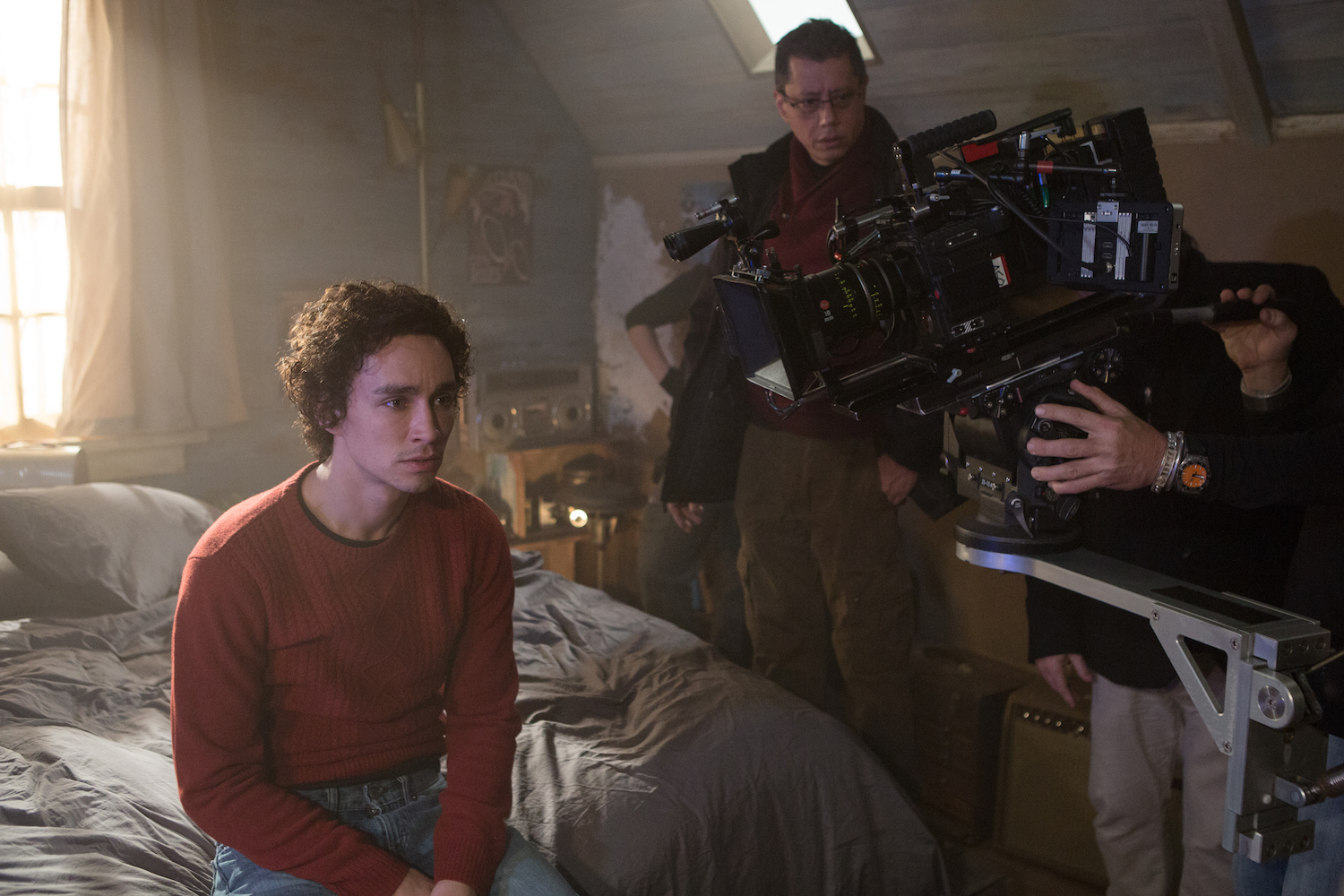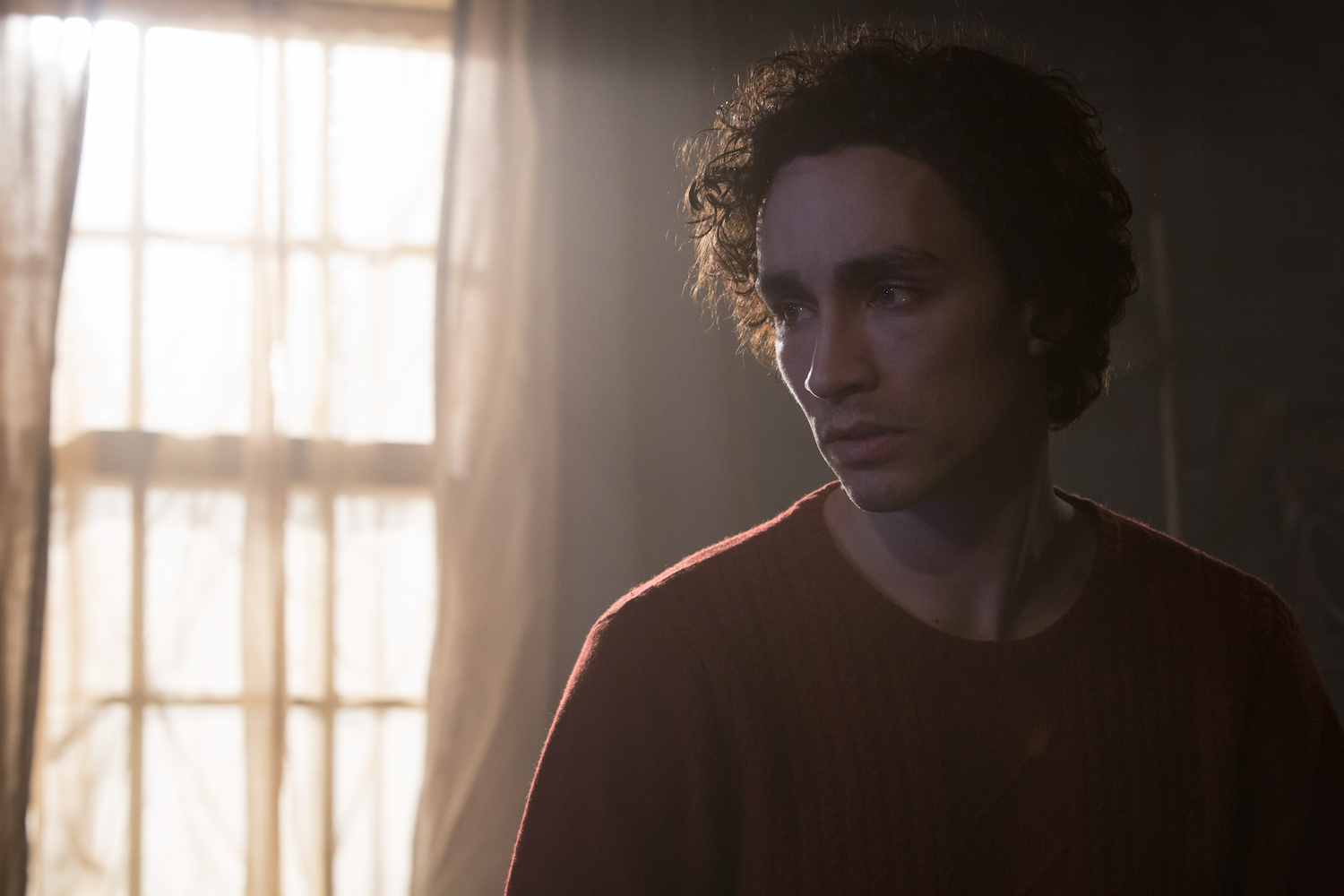Cat and mouse is the best way to describe the story of Bad Samaritan. The hero is hardly a Boy Scout, and the bad guy is wonderfully bad. The audience is pushed somewhere into the middle, where you often are more curious how the plot will twist than if the hero will ultimately succeed.
Oh, and, there’s lots of tech. Bad Samaritan is all very 21st Century America.
David Tennant (Doctor Who, Jessica Jones) is the tech-loving control freak and very bad baddie. Robert Sheehan (The Mortal Instruments, Mute) is the good guy who starts out as a not so good valet. His hero-instincts aren’t particularly sharp, either, which drives the film through a series of unusual twists and turns set against the very cold and damp backdrop of Portland, Oregon.
At sunny and warm West Hollywood’s London Hotel, the movie’s stars, along with director (and veteran producer) Dean Devlin, and screenwriter Brandon Boyce sat down with local press to talk about the indie thriller, a film Devlin described as the greatest experience of his career.
Q: Were you seeking a really dark character to play and what work went into the portrayal of Cale, the psychopath?
David Tennant: I love the idea that you feel in some way I was being tactical. I just got this script and thought this is an amazing story and a bonkers character. I just jumped at the chance, really. I wasn’t specifically angling to play a psychotic monster. But there’s something rather delicious in exploring those darker corners of the human psyche, of course.
I have been reading up on psychopaths in recent history because I played another one for Marvel. There’s lots to read — I was reading something Brandon gave me, The Wisdom of Psychopaths — and then you just have to set yourself free into this character and try and find the empathy. Which is hard when he has none.

Q: How did the story come together?
Brandon Boyce: It certainly started with the idea, from the technology perspective, of giving your keys to a valet and what you’re really handing that person. And then once that person is in your car, our GPS now has a ‘home’ button or there’s an address on our registration, and we get to the house and there’s an automatic device that opens it, and now we’re in the garage and no one ever locks the door to the kitchen, and now they’re in your house.
That was the impetus for the whole idea.
And then I thought, wouldn’t it be interesting to turn that around and if the person breaking into that house had his life completely blown open. What would that take? It would take a very smart psychopath and a person who I actually care about who should probably not be breaking into houses.
To be honest, I think poor valets probably get blamed for everything missing from a car just like the person that cleans your house is responsible for everything missing from your house. I had an incredibly short-lived career as a valet and I think for the most part they are completely doing their jobs and we just misplace stuff in our cars all the time.
Q: Why did you cast David and Robert?
Dean Devlin: There comes a time when you start to see things on TV or movies and you just lust, ‘wouldn’t it be great to work with these guys?’ Both these actors were my dream choices.
I’d gone crazy over Robbie in the TV series Misfits. I did a movie a couple of years ago, and I wrote a part for Robbie, and was fortunate enough to get him to do it. When we started working I realized the depth of his skill level. I slipped him the script [for Bad Samaritan] and said, ‘You gotta do it.’
David, I’m just crazy about all of his work. Normally, when an audience loves an actor for a certain kind of part, they’ll tolerate or even admire them doing something different, but they really want them to do the thing they fell in love with. David is one of the few people I’ve seen where they fell in love with him in Doctor Who, but they also fell in love with him on Broadchurch and they also fell in love with him on Jessica Jones. Three totally different characters. I’ve never seen that before.
When I went to ask David to be in the movie, I was trying to pretend like I’m a sophisticated director and we were doing this Skype call and two minutes into it, I start ‘fanboying,’ asking about the Tardis. It was just embarrassing. Not only was I wearing a Doctor Who shirt, David pointed out it was for the 11th Doctor [played by actor Matt Smith. Tennant was the 10th Doctor Who, from 2005-2010]

Q:Technology plays a big role in the movie, why so?
Brandon Boyce: The short answer is I was making shit up that didn’t really exist. But I totally believe this guy [Cale] would have found a way to make this stuff happen. And a lot of this stuff now exists. I thought ‘well, they’ll never actually get this with the facility that Cale can use it.’ But we put a lot of faith in locks and passwords. I’m very interested in that and have been for a couple of years in my writing and so I’m just kind of picking away at that sense of security we give ourselves. I start with a question and maybe I get an answer for myself by the end of the writing.
Dean Devlin: We’ve been screening the movie around the country and it’s been fun because you hear where the people scream and where they laugh, and it tends to be fairly consistent, but David and I were in Silicon Valley where we screened the movie, and we got all these cheers on all the technology, which we’d never got before. Afterward, they told us, ‘First movie to get the technology right!’ I didn’t want to say, ‘yeah, the writer made it up.’
Q: Was the difference between the darkness of the character and the real world tough to shift between?
David Tennant: Worryingly not. You’d have to ask the people around me, but I felt like I was entirely balanced at all times. You do go to a dark place, but there’s something weirdly liberating about that, because you get to indulge in all those things that normally, hopefully our functioning psychology doesn’t let us do. You get to dabble in what it would feel like to have no guilt. And for a Scottish presbyterian whose engine in life is guilt, to get to enjoy a guilt-free moment in an entirely safe environment where nobody’s getting hurt, there’s something kind of giddy about it.
Robert Sheehan: I think there’s something rather cathartic about expressing the darker side of our nature in a safe environment. I have a friend who used to self harm when he was 17 or 18 and he said by the time he was in the ambulance and they were bandaging him up, he was totally calm and relaxed and telling them ‘Oh sorry about all this silly bother,’ because the madness had gone by that point.
The darkness my character Sean has to encounter and go down the rabbit hole of, is to do with shame, which I suppose is paradoxical to Cale’s lack of emotional journey. There’s a lot of meaty stuff there for Sean, as well.
David Tennant: I think what’s interesting about those characters as well is they recognize something in each other. They’re very different, but there’s something that intoxicates them both and subconsciously they recognize it.

Q: What is it that makes Cale a bad guy?
David Tennant: A lack of self-awareness is right up there. He’s a broken human being who doesn’t realize he is. He’s fatally damaged and thinks he’s the only one in the world who isn’t.
Q: Who scared you as a kid?
David Tennant: The only time I really remember being scared watching a movie was from the child catcher in Chitty Chitty Bang Bang. It was utterly terrifying. Even now I have to look away. How much of that got channeled into Cale, I’ll let the audience decide. But if it has half the effect on any member of the audience that the child catcher has on me, then I will feel like I’ve done my job well.
Q: Was Cale’s general lack of backstory intentional?
Brandon Boyce: With a psychopath, they think there’s something wrong with everybody else. They are nomadic by nature. They don’t have a lot of entanglements in their life, so in some ways, it’s like a shark. You don’t need to explain why a shark is a shark. I’m fine with throwing the audience in there and thinking they’re going to know what kind of guy this is. I didn’t feel the need to over explain everything. I felt like the audience will come along.
